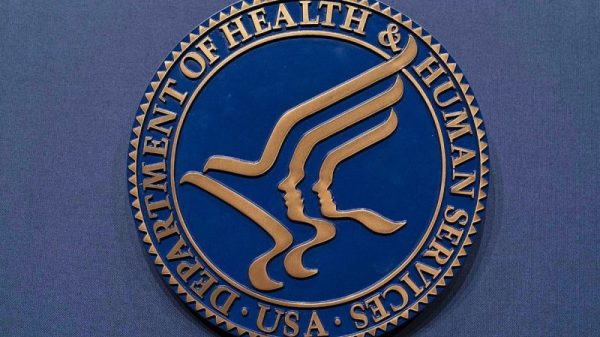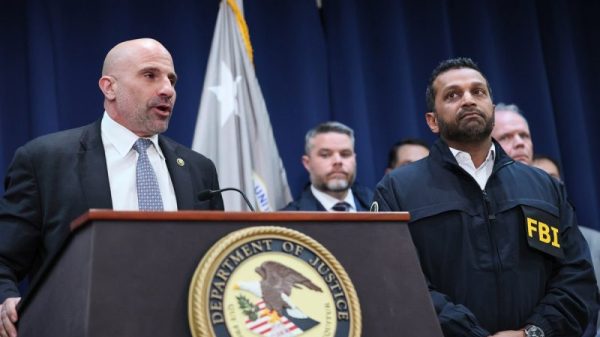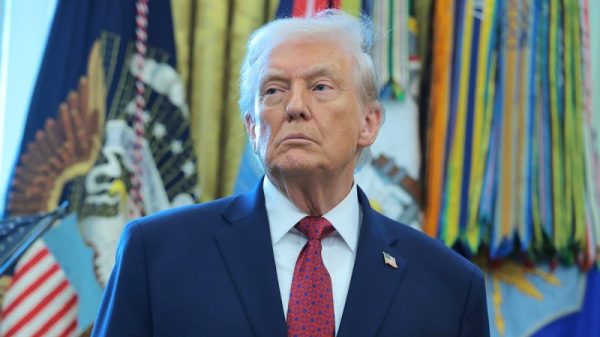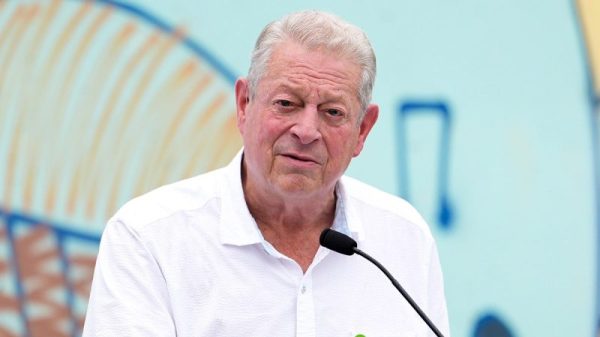President Biden and former president Donald Trump have been running for 11 and 16 months, respectively. Biden never had a serious challenger in the Democratic primary and has easily won in every state. Trump consistently led other Republicans in polls, with a widening advantage since he started facing indictments in four cases, and won everywhere except Vermont and D.C. Last Tuesday, both accrued enough pledged delegates to secure their party’s nominations, setting up a rematch in November.
Some Americans aren’t buying it.
In surveys, focus groups and interviews, some voters are expressing doubts that the presumptive nominees will in fact be the nominees. In a Monmouth University national poll conducted last month, almost half of voters said it was “very” or “somewhat” likely that Biden would be replaced as the Democratic nominee by November, and about a third said the same of Trump. An Economist/YouGov survey taken as both candidates clinched their nominations found 33 percent of Americans thought a Biden-Trump rematch would “definitely” happen, 44 percent said it would probably happen, and the rest were less certain.
“I think there’s still time,” said Alfonso Ramirez, a 56-year-old independent voter in Glendale, Ariz., who was holding out hope for a different Democrat but would choose Trump in a rematch. “Uno nunca sabe,” he added in Spanish, meaning, “You never know.”
Those doubts are another unusual feature of this year’s presidential campaign: a rematch between two presidents, both effectively running as incumbents within their parties, and both historically unpopular. In the Economist/YouGov poll, 54 percent said they viewed Biden unfavorably and the same percentage did not want him to run again, compared to 50 percent on both questions for Trump.
For some, that dissatisfaction crosses over into disbelief.
“How can he even run with that hanging over his head?” an undecided voter named Linda from Wisconsin said of Trump’s indictments in a January focus group conducted by the firm GBAO for the Democratic group Navigator Research. “I’m hoping these aren’t the two candidates, but I’m afraid they are. One’s older than the other, one’s more senile than the other. It scares me.”
Navigator’s senior director, Bryan Bennett, said voters who support Biden are more convinced he’ll be the nominee, while those who disapprove are less sure. Bennett attributed this “believability gap” to denial among left-leaning and moderate young Americans, and another way for conservatives to express disapproval of the president.
But some voters’ doubts stem from genuine uncertainties in an unprecedented and unpredictable election year. In follow-up questions for the Monmouth survey, voters who thought the nominees would be replaced before November provided reasons such as Biden’s age (81), physical or mental health, and for Trump, his criminal charges or health (he is 77).
Some voters have expressed misperceptions of Trump’s legal problems as they explained their disbelief that he is running.
“Personally, I thought Trump was still in jail, so this is news to me,” a voter named Rhea said in a
Navigator focus group from November. “It’s mind-blowing that he has charges against him and he’s still running.”
Biden’s doctor has released a report saying he is fit to serve. But polls show persistent concerns about his age and mental sharpness. In interviews and focus groups, many voters have winced at Biden’s verbal stumbles and voiced discomfort about his age.
“I just have this terrible picture of a marginally senile Biden getting up there and saying, ‘Hey guys, you’re right. I need a break from all this,’” a two-time Trump voter named Paul from Ohio said in another focus group conducted by Republican Voters Against Trump.
Such concerns about Biden’s health or stamina reflect the impact of Republican attacks portraying him as feeble and declining. Trump (who sometimes trips up his own words) has stoked questions about Biden’s future on the Democratic ticket with asides such as “I don’t think that Biden will make it to the gate,” in a December interview with the far-right website Breitbart. An ad this month from the main pro-Trump super PAC questioned Biden’s longevity and ended on a clip of Vice President Harris laughing. The Trump campaign did not respond to requests for comment.
“This is a very, very unique election,” said John McLaughlin, a pollster for the Trump campaign. “Definitely more than usual think something could happen to Biden’s health, and Harris would be president. Then there are those voters who think Biden wants to put Trump in jail.”
Researchers in both parties say dread about the election, along with more generalized exhaustion with politics and news, is causing many voters to tune out. The Biden campaign has made that part of its case to explain how it will overcome the president’s poor performance in approval ratings and head-to-head polls, arguing that voters will return to Biden once they start facing the reality of a second Trump administration.
“That choice is no longer hypothetical,” Biden campaign spokesman Ammar Moussa said. “President Biden looks forward to spending the next eight months reminding the American people how dangerous Donald Trump and his extremist agenda are.”
Unlike in most elections, where campaigns get an opportunity to introduce their candidate to voters, both candidates this year are already almost universally well known — and predominantly disliked. An unusually large group of voters say they have unfavorable views of Biden and Trump: 19 percent in a February New York Times-Siena College poll. Such “double negative” or “double haters” supported Biden over Trump 45 percent to 33 percent — which researchers say could be a leading indicator.
“A similar number of voters on both sides are showing consistent fatigue and disinterest and dissatisfaction with politics in general,” said Matt Canter, a partner at the Democratic polling firm Global Strategy Group. “The electorate is going to be slower to engage, but there is a lot of Trump amnesia and that presents a real opportunity for the Biden campaign because voters aren’t paying attention, and as voters begin to pay attention, there’s a lot about Trump that’s going to become front and center that they wont like.”
Emily Guskin contributed to this report.
President Biden and former president Donald Trump have been running for 11 and 16 months, respectively. Biden never had a serious challenger in the Democratic primary and has easily won in every state. Trump consistently led other Republicans in polls, with a widening advantage since he started facing indictments in four cases, and won everywhere except Vermont and D.C. Last Tuesday, both accrued enough pledged delegates to secure their party’s nominations, setting up a rematch in November.
Some Americans aren’t buying it.
In surveys, focus groups and interviews, some voters are expressing doubts that the presumptive nominees will in fact be the nominees. In a Monmouth University national poll conducted last month, almost half of voters said it was “very” or “somewhat” likely that Biden would be replaced as the Democratic nominee by November, and about a third said the same of Trump. An Economist/YouGov survey taken as both candidates clinched their nominations found 33 percent of Americans thought a Biden-Trump rematch would “definitely” happen, 44 percent said it would probably happen, and the rest were less certain.
“I think there’s still time,” said Alfonso Ramirez, a 56-year-old independent voter in Glendale, Ariz., who was holding out hope for a different Democrat but would choose Trump in a rematch. “Uno nunca sabe,” he added in Spanish, meaning, “You never know.”
Those doubts are another unusual feature of this year’s presidential campaign: a rematch between two presidents, both effectively running as incumbents within their parties, and both historically unpopular. In the Economist/YouGov poll, 54 percent said they viewed Biden unfavorably and the same percentage did not want him to run again, compared to 50 percent on both questions for Trump.
For some, that dissatisfaction crosses over into disbelief.
“How can he even run with that hanging over his head?” an undecided voter named Linda from Wisconsin said of Trump’s indictments in a January focus group conducted by the firm GBAO for the Democratic group Navigator Research. “I’m hoping these aren’t the two candidates, but I’m afraid they are. One’s older than the other, one’s more senile than the other. It scares me.”
Navigator’s senior director, Bryan Bennett, said voters who support Biden are more convinced he’ll be the nominee, while those who disapprove are less sure. Bennett attributed this “believability gap” to denial among left-leaning and moderate young Americans, and another way for conservatives to express disapproval of the president.
But some voters’ doubts stem from genuine uncertainties in an unprecedented and unpredictable election year. In follow-up questions for the Monmouth survey, voters who thought the nominees would be replaced before November provided reasons such as Biden’s age (81), physical or mental health, and for Trump, his criminal charges or health (he is 77).
Some voters have expressed misperceptions of Trump’s legal problems as they explained their disbelief that he is running.
“Personally, I thought Trump was still in jail, so this is news to me,” a voter named Rhea said in a
Navigator focus group from November. “It’s mind-blowing that he has charges against him and he’s still running.”
Biden’s doctor has released a report saying he is fit to serve. But polls show persistent concerns about his age and mental sharpness. In interviews and focus groups, many voters have winced at Biden’s verbal stumbles and voiced discomfort about his age.
“I just have this terrible picture of a marginally senile Biden getting up there and saying, ‘Hey guys, you’re right. I need a break from all this,’” a two-time Trump voter named Paul from Ohio said in another focus group conducted by Republican Voters Against Trump.
Such concerns about Biden’s health or stamina reflect the impact of Republican attacks portraying him as feeble and declining. Trump (who sometimes trips up his own words) has stoked questions about Biden’s future on the Democratic ticket with asides such as “I don’t think that Biden will make it to the gate,” in a December interview with the far-right website Breitbart. An ad this month from the main pro-Trump super PAC questioned Biden’s longevity and ended on a clip of Vice President Harris laughing. The Trump campaign did not respond to requests for comment.
“This is a very, very unique election,” said John McLaughlin, a pollster for the Trump campaign. “Definitely more than usual think something could happen to Biden’s health, and Harris would be president. Then there are those voters who think Biden wants to put Trump in jail.”
Researchers in both parties say dread about the election, along with more generalized exhaustion with politics and news, is causing many voters to tune out. The Biden campaign has made that part of its case to explain how it will overcome the president’s poor performance in approval ratings and head-to-head polls, arguing that voters will return to Biden once they start facing the reality of a second Trump administration.
“That choice is no longer hypothetical,” Biden campaign spokesman Ammar Moussa said. “President Biden looks forward to spending the next eight months reminding the American people how dangerous Donald Trump and his extremist agenda are.”
Unlike in most elections, where campaigns get an opportunity to introduce their candidate to voters, both candidates this year are already almost universally well known — and predominantly disliked. An unusually large group of voters say they have unfavorable views of Biden and Trump: 19 percent in a February New York Times-Siena College poll. Such “double negative” or “double haters” supported Biden over Trump 45 percent to 33 percent — which researchers say could be a leading indicator.
“A similar number of voters on both sides are showing consistent fatigue and disinterest and dissatisfaction with politics in general,” said Matt Canter, a partner at the Democratic polling firm Global Strategy Group. “The electorate is going to be slower to engage, but there is a lot of Trump amnesia and that presents a real opportunity for the Biden campaign because voters aren’t paying attention, and as voters begin to pay attention, there’s a lot about Trump that’s going to become front and center that they wont like.”
Emily Guskin contributed to this report.





















